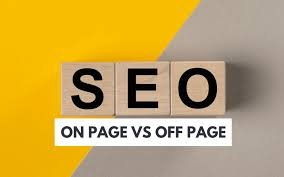On-Page SEO vs Off-Page SEO – Key Differences & Strategies
SEO is divided into two main categories: On-Page SEO and Off-Page SEO. Both play a crucial role in improving your website’s search rankings, visibility, and traffic. But what exactly are they, and how do they differ? In this guide, we’ll break down the differences, importance, and best strategies for both On-Page and Off-Page SEO to help you dominate Google rankings in 2025! What is On-Page SEO? (Complete Breakdown) On-Page SEO refers to optimizing elements within your website to improve search rankings. This includes content, HTML tags, URL structure, and internal linking. 🔹 Key Factors of On-Page SEO: ✅ Keyword Optimization – Using high-ranking keywords naturally in your content✅ Title Tags & Meta Descriptions – Writing click-worthy titles & descriptions✅ URL Structure – Creating SEO-friendly, short URLs✅ Image Optimization – Using alt text and compressed images✅ Internal Linking – Linking to relevant pages within your site✅ Mobile-Friendliness – Ensuring your site is responsive✅ Page Speed Optimization – Improving loading time for better UX ✔ Goal: Make your website search-engine friendly so Google can easily crawl, index, and rank your pages. Best On-Page SEO Strategies for 2025 1. Optimize Your Title Tags & Meta Descriptions Your title and meta description should include primary keywords while being engaging and click-worthy. ✔ Example of an SEO-Optimized Title:❌ Bad: “SEO Tips 2025”✅ Good: “Top 10 SEO Tips for 2025 (Boost Your Rankings Fast!)” ✔ Example of an SEO-Optimized Meta Description:“Learn the latest SEO strategies for 2025! Discover expert tips on On-Page and Off-Page SEO to improve your Google rankings.” 2. Use SEO-Friendly URLs ✅ Keep URLs short, clean, and keyword-rich✅ Avoid random numbers or unnecessary words ✔ Example:❌ Bad: yourwebsite.com/p=12345✅ Good: yourwebsite.com/on-page-vs-off-page-seo 3. Improve Content Quality & Keyword Usage Content is the most important ranking factor. Google prioritizes useful, in-depth, and engaging content. ✅ Write detailed, informative, and original content✅ Use long-tail keywords naturally✅ Answer user queries clearly✅ Avoid keyword stuffing ✔ Example:❌ Bad: “On-Page SEO is important. On-Page SEO helps rankings. On-Page SEO improves websites.”✅ Good: “On-Page SEO is crucial because it helps search engines understand your content and improves your rankings naturally.” 4. Optimize Images for SEO ✅ Compress images to improve page speed✅ Use descriptive alt text for better accessibility ✔ Example Alt Text:❌ Bad: image123.jpg✅ Good: on-page-seo-strategies-2025.jpg 5. Improve Internal Linking Structure ✅ Link to relevant blog posts and pages within your website✅ Use keyword-rich anchor text ✔ Example:“To improve your SEO rankings, check out our guide on Best SEO Tools for 2025.” What is Off-Page SEO? (Complete Breakdown) Off-Page SEO refers to external factors that influence your website’s authority, credibility, and trustworthiness. This includes backlinks, brand mentions, social media signals, and influencer collaborations. 🔹 Key Factors of Off-Page SEO: ✅ Backlink Building – Getting high-quality backlinks from authority sites✅ Guest Blogging – Writing content for reputable websites✅ Social Media Engagement – Promoting content on social platforms✅ Brand Mentions – Being featured on other websites✅ Influencer Outreach – Collaborating with industry experts ✔ Goal: Increase your website’s authority and trust to improve rankings. Best Off-Page SEO Strategies for 2025 1. Build High-Quality Backlinks (Not Spammy Ones!) Backlinks are the #1 ranking factor in Google’s algorithm. ✅ Focus on high-authority websites (DA 50+)✅ Avoid spammy backlinks (low-quality sites, PBNs)✅ Get natural, contextual links ✔ Example of Good vs. Bad Backlinks:❌ Bad: Paid backlinks from random directories✅ Good: Guest posts or mentions from authority sites like Forbes, HubSpot, Moz 2. Write Guest Blog Posts Guest blogging helps you gain exposure and earn powerful backlinks. ✔ Example:“Write a high-quality guest post for an authority blog in your industry, include a backlink to your site, and increase referral traffic!” 3. Get Social Media Mentions & Shares Even though social media isn’t a direct ranking factor, Google considers brand popularity. ✅ Share your content on Facebook, Twitter, LinkedIn, and Pinterest✅ Engage with industry influencers✅ Get users to share your content ✔ Pro Tip: Viral content on social media = more backlinks! 4. Engage in Forum & Community Discussions ✅ Answer questions on Quora & Reddit✅ Join Facebook & LinkedIn groups✅ Contribute to industry forums (Moz, Warrior Forum, BlackHatWorld) ✔ Example:“Answer SEO-related questions on Quora with valuable insights and link back to your blog post for detailed information.” 5. Get Listed in Local Directories & Citations ✅ Submit your website to Google My Business, Yelp, and industry directories✅ Ensure NAP (Name, Address, Phone) consistency ✔ Example:“If you run a digital marketing agency, listing your business in local directories can improve your local SEO rankings.” On-Page SEO vs. Off-Page SEO – Key Differences Feature On-Page SEO Off-Page SEO Focus Area Website content & structure External factors (backlinks, authority) Goal Optimize content & user experience Build trust & domain authority Main Strategies Keywords, meta tags, internal linking, content quality Backlink building, social media, guest blogging Control You have full control Depends on external websites Final Thoughts – Master On-Page & Off-Page SEO for Success! Both On-Page SEO and Off-Page SEO are essential for ranking higher on Google. ✅ On-Page SEO improves your website’s structure, content, and user experience.✅ Off-Page SEO builds your authority, backlinks, and credibility.✅ The best SEO strategy? Use both together for maximum rankings & traffic! 🚀 Which SEO strategy do you focus on more? Let me know in the comments!

